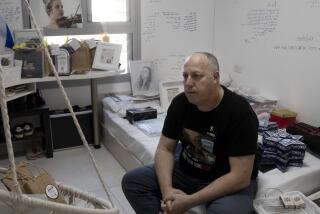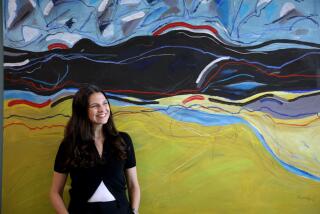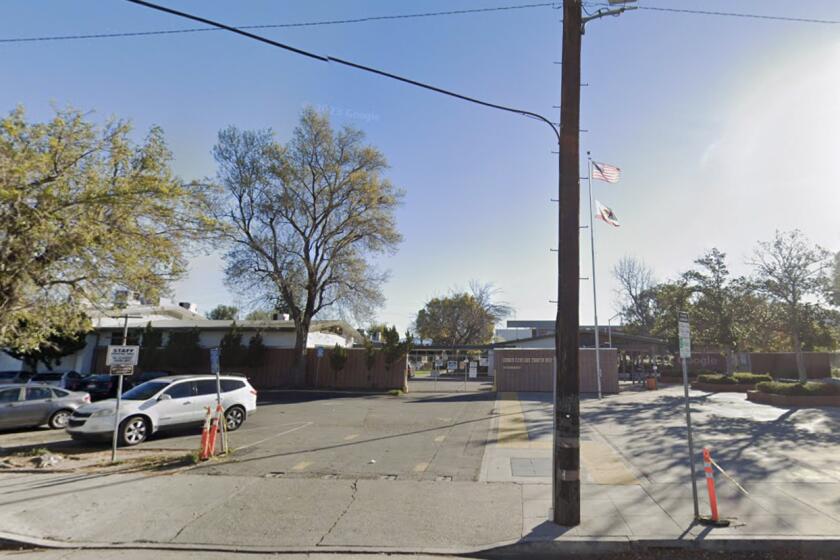Shiva Sisters offer kind words, practical help for Jewish families at times of loss
The early arrivals got the good seats, 115 folding chairs facing the pool. Other guests grabbed standing-room-only spots under giant umbrellas or stood blinking in the sun; still others jammed into the living room and family room, watching and listening through open sliding glass doors.
“Good morning to all of you, on this beautiful, radiant Sunday,” Rabbi Carla Howard began, from a lectern on the far side of the pool. “We come together at the home of Lee and Michael to honor, celebrate and, finally, say goodbye to Lee Ivan Weinstein.”
It was just before noon, and the Weinstein memorial service was proceeding like clockwork in a spectacular Los Feliz hillside home overlooking the sun-washed city below.
Behind a closed door, the kitchen was a hive of frenetic activity. And there was a small problem.
The memorial had drawn about 300 people, roughly 100 more than expected. It was warm, and people were thirsty. While everyone else listened to the eulogies, Danna Black made a dash to Ralphs. When she returned, she was lugging bags full of soda and ice to replenish the exhausted supplies.
Another minor crisis averted by the Shiva Sisters.
The Shiva Sisters are two women, Black and Allison Moldo, who have started an event planning business with an unusual focus.
They deal with death — specifically, Jewish mourning — with an only-in-L.A. panache. They arrange catering, equipment rentals and general assistance for after-funeral gatherings, including valet parking, video production, personal shopping and — there is no better way to say it — Jewish mothering.
“They kind of just swoop in and mother you,” said Michael Berman, Lee Weinstein’s partner of 30 years, who hired the Shiva Sisters on the advice of Rabbi Howard. “They’re not just planning a party and an event, but they’re compassionate and understanding at a time when people are grieving.”
In Jewish tradition, shiva (the Hebrew word for seven) is the initial period of mourning after the burial of an immediate family member. Families “sit shiva” at home for seven days, during which extended family and friends are expected to come to console them, feed them and join in prayer.
Their name aside, the Shiva Sisters don’t usually have much to do with shiva, at least not in any traditional sense. Their clients tend to be people who are Jewish by birth, maybe by upbringing, but not usually by practice.
Then someone dies. People who haven’t set foot in a synagogue in years want a Jewish funeral, with a rabbi presiding, and some kind of Jewish gathering afterward. In traditional parlance, this gathering is called the “meal of consolation.” A better term in this case might be “lunch.”
“A lot of them feel like they need to serve deli platters,” Moldo said, “because that’s the tradition.”
In Judaism, as in other faiths, the community has traditionally taken care of a grieving family. But as society has become atomized, that has grown more difficult, especially in a place like Southern California, where people are spread out and many have moved here from somewhere else.
Virtually every Jewish congregation has a “caring committee” to support families in mourning. But increasingly, Americans are not affiliated with any religious institution, and Jews are no exception. In Southern California, about 30% of the Jewish population is affiliated with a synagogue, according to Rabbi Mark Diamond, executive vice president of the Board of Rabbis of the Greater Los Angeles Jewish Federation.
“There is no adequate substitute for the warmth, the care and concern of that community,” Diamond said of the synagogue. “Particularly for unaffiliated families, I think what the Shiva Sisters are doing is very noble. And it is a sign of our times that professionals step in to fulfill unmet needs.”
The Shiva Sisters began in October 2009, after a particularly bad period in their own lives. Black was an event planner; Moldo worked in the mortgage business. Each was in her late 40s, with parents and other relatives who were aging, and each had been through a string of losses.
At an uncle’s funeral, Black overheard a cousin. “She said, ‘I wish there was someone who could help us do this,’” Black recalled. “I realized, I could do this.” She talked to Moldo, a friend from their children’s preschool days.
“We just knew,” Black said. “We’re the perfect demographic, and we knew there was no one to help.”
In addition, she said, both of them had a certain comfort level with the subject — she more than Moldo. “People are just afraid to talk about death,” Black said. “They think if they speak of it, they’re going to die. We know from experience that’s not true.”
There followed months of discussions with rabbis to learn the fine points of Jewish mourning rituals. They attended seminars on death and dying and read every book they could find on the subject.
Several months into the business, they entered into a formal arrangement with Hillside Memorial Park in Culver City, which included the Shiva Sisters as an option in its new “Concierge Service” for mourners. Clients come to them from elsewhere too.
Some funeral directors have begun offering similar services for mourners of all faiths, according to Jessica Koth, a spokeswoman for the National Funeral Directors Assn. “This is sort of a new and growing area within the profession,” she said.
The Shiva Sisters do not, as a rule, plan funerals, focusing instead on the after-funeral gathering, usually at the family’s home. Once, guests could be counted on to arrive bearing cakes and casseroles. That’s not so true anymore.
“It’s not like people are saying, ‘Can I make a kugel?’” Moldo said, referring to a traditional Jewish noodle casserole. “Those days are over.”
And this is L.A., which means some people are a little picky about the choice of caterer, and parking is always an issue. Hence, the valets, who can instantly transform the sidewalk of a suburban neighborhood into the curbside of Pizzeria Mozza.
The Shiva Sisters help people with Jewish ritual, which can mean washing one’s hands before entering the home, covering mirrors (done for several reasons, including the avoidance of vanity), burning memorial candles and actually sitting shiva, ideally on low seats or cushions.
Many families will perform some, but not all, of the rituals. Some, like Berman, will do virtually none. The Shiva Sisters don’t push, although they do draw some lines. One woman wanted a no-host bar in a synagogue. “We said no,” Black said. “She thought we were insane.”
Lee Weinstein was 65 when he died of cancer. He had spent 32 years working for the Westside Regional Center in Culver City, helping people with developmental disabilities. He and Berman, an interior and furniture designer, met while playing pinball at a July 4 party in 1980; they were together until parted by death.
The memorial brought together people from diverse worlds. They were gay and straight; white, black, Latino and Asian; Jewish and Christian. They were there to remember a man who was variously described as calm, kind, supportive, protective, “so damn smart,” humorous, handsome and a serious pickle lover.
Before the service began, the Shiva Sisters and their crew — seven people, not including the seven parking attendants — circulated with hors d’oeuvres and glasses of orange juice, lemonade and water. The entire crew was dressed in black, wearing aprons emblazoned with the Shiva Sisters logo, featuring a stylized version of their name.
When trays of prosciutto sandwiches came out, Black shrugged. “Very non-kosher,” she said. “You see, we do what the family wants.”
Berman would later say that he and Weinstein “were Jews but not religious.” Still, in the eulogy he delivered, he said he thought of his partner as a tzadik, a Jewish term for a righteous person.
The service went off without a hitch. A string ensemble played; friends, relatives and co-workers offered moving eulogies. Howard spoke, touching on Jewish themes without reciting prayers, not even the traditional Jewish mourners’ prayer, the Kaddish.
At one point, while the ensemble played the song “Smile,” two hawks appeared in the cloudless sky, circling lazily over the Weinstein-Berman house. People began to point, some wiping tears.
The Shiva Sisters couldn’t claim credit for that.
mitchell.landsberg@latimes.com
More to Read
Start your day right
Sign up for Essential California for news, features and recommendations from the L.A. Times and beyond in your inbox six days a week.
You may occasionally receive promotional content from the Los Angeles Times.






